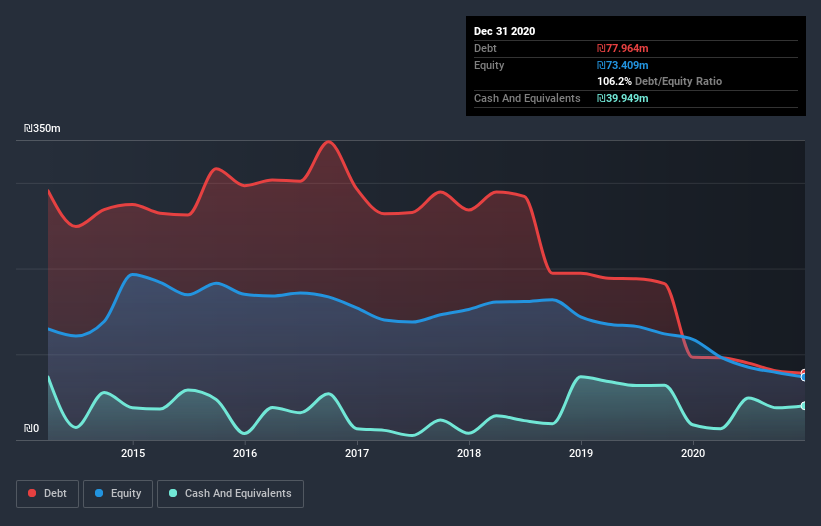David Iben put it well when he said, 'Volatility is not a risk we care about. What we care about is avoiding the permanent loss of capital.' So it might be obvious that you need to consider debt, when you think about how risky any given stock is, because too much debt can sink a company. We can see that Aviv Arlon Ltd. (TLV:AVLN) does use debt in its business. But the more important question is: how much risk is that debt creating?
What Risk Does Debt Bring?
Debt assists a business until the business has trouble paying it off, either with new capital or with free cash flow. Ultimately, if the company can't fulfill its legal obligations to repay debt, shareholders could walk away with nothing. However, a more usual (but still expensive) situation is where a company must dilute shareholders at a cheap share price simply to get debt under control. By replacing dilution, though, debt can be an extremely good tool for businesses that need capital to invest in growth at high rates of return. When we examine debt levels, we first consider both cash and debt levels, together.
See our latest analysis for Aviv Arlon
How Much Debt Does Aviv Arlon Carry?
As you can see below, Aviv Arlon had ₪78.0m of debt at December 2020, down from ₪96.4m a year prior. However, because it has a cash reserve of ₪39.9m, its net debt is less, at about ₪38.0m.

How Strong Is Aviv Arlon's Balance Sheet?
According to the last reported balance sheet, Aviv Arlon had liabilities of ₪59.8m due within 12 months, and liabilities of ₪36.4m due beyond 12 months. Offsetting this, it had ₪39.9m in cash and ₪6.32m in receivables that were due within 12 months. So its liabilities outweigh the sum of its cash and (near-term) receivables by ₪49.9m.
This is a mountain of leverage relative to its market capitalization of ₪61.0m. This suggests shareholders would be heavily diluted if the company needed to shore up its balance sheet in a hurry. When analysing debt levels, the balance sheet is the obvious place to start. But you can't view debt in total isolation; since Aviv Arlon will need earnings to service that debt. So if you're keen to discover more about its earnings, it might be worth checking out this graph of its long term earnings trend.
In the last year Aviv Arlon wasn't profitable at an EBIT level, but managed to grow its revenue by 168%, to ₪32m. So its pretty obvious shareholders are hoping for more growth!
Caveat Emptor
Even though Aviv Arlon managed to grow its top line quite deftly, the cold hard truth is that it is losing money on the EBIT line. To be specific the EBIT loss came in at ₪3.2m. Considering that alongside the liabilities mentioned above does not give us much confidence that company should be using so much debt. Quite frankly we think the balance sheet is far from match-fit, although it could be improved with time. We would feel better if it turned its trailing twelve month loss of ₪44m into a profit. In the meantime, we consider the stock very risky. The balance sheet is clearly the area to focus on when you are analysing debt. However, not all investment risk resides within the balance sheet - far from it. These risks can be hard to spot. Every company has them, and we've spotted 2 warning signs for Aviv Arlon (of which 1 doesn't sit too well with us!) you should know about.
If you're interested in investing in businesses that can grow profits without the burden of debt, then check out this free list of growing businesses that have net cash on the balance sheet.
If you’re looking to trade Aviv Arlon, open an account with the lowest-cost* platform trusted by professionals, Interactive Brokers. Their clients from over 200 countries and territories trade stocks, options, futures, forex, bonds and funds worldwide from a single integrated account. Promoted
New: AI Stock Screener & Alerts
Our new AI Stock Screener scans the market every day to uncover opportunities.
• Dividend Powerhouses (3%+ Yield)
• Undervalued Small Caps with Insider Buying
• High growth Tech and AI Companies
Or build your own from over 50 metrics.
This article by Simply Wall St is general in nature. It does not constitute a recommendation to buy or sell any stock, and does not take account of your objectives, or your financial situation. We aim to bring you long-term focused analysis driven by fundamental data. Note that our analysis may not factor in the latest price-sensitive company announcements or qualitative material. Simply Wall St has no position in any stocks mentioned.
*Interactive Brokers Rated Lowest Cost Broker by StockBrokers.com Annual Online Review 2020
Have feedback on this article? Concerned about the content? Get in touch with us directly. Alternatively, email editorial-team (at) simplywallst.com.
About TASE:CNGL
Canada Global (T.R)
Engages in the development, construction, improvement, leasing, management, and sale of real estate properties in the United States, Serbia, England, and Germany.
Mediocre balance sheet with questionable track record.
Market Insights
Community Narratives



